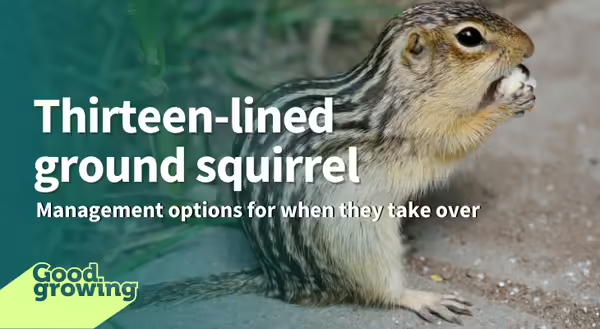
Gnawing Rodents and Landscape Shrubs
This past spring, I found myself at a friend’s house enjoying some barbeque on the back deck. He remarked on the issue they had with ground squirrels, burrowing all over their yard and landscape beds. Later in the year, a phone call came into the office of a landscaper confounded at what was happening to the trees and shrubs of a client’s yard. With an address that sounded familiar, I headed over to see if we could unravel this mystery.
I found several shrubs and groundcovers, namely creeping juniper, that had significant dieback at this home. With no sign of disease on the foliage, we parted the branches to reveal stems and branches devoid of bark. Distinct chewing marks were present implicating this was the work of a small rodent. But what type of rodent?
Looking up the street I saw my friend’s home where I enjoyed some great BBQ a few weeks before and remembered his comment on ground squirrels. I asked, “Have you seen any ground squirrels lately?”
“Oh yes!” replied the homeowner, “Every morning we see nearly a dozen of them.” Not a minute went by and a thirteen-lined ground squirrel ran right across the homeowner’s shoe. Yup, I think we have a culprit.
Thirteen-lined ground squirrels
Thirteen-lined ground squirrels (Spermophilus tridecemlineatus) are common in Illinois home landscapes as they prefer short-cut lawns that they can see over the top when standing on their hind legs. Golf courses, cemeteries, and parks are all great settings for thirteen-lined ground squirrels. True to its name, the thirteen-lined ground squirrel has thirteen prominent alternating light and dark stripes on their back and sides. Thirteen-lined grounded squirrels average 11 inches long, including a 5-inch tail.
While these little guys will gnaw on woody plant stems, they feed mostly on grasses, weeds, and seeds. Thirteen-lined ground squirrels are a particular pest of crop seed in both farm fields and vegetable gardens. Thirteen-lined ground squirrels are not very territorial, so in areas of abundant food and habitat, you may have several families living nearby. The neighborhood of the aforementioned homes just so happens to back up to a golf course. Thus, creating a perfect opportunity for a ground squirrel population explosion.
Managing thirteen-lined ground squirrel
Controlling thirteen-lined ground squirrels can be difficult, but there are a few options:
- Ground squirrels are an important part of the food chain. Predators like hawks and snakes will help you in managing their numbers. In other words - don’t kill every snake you see in your yard!
- Hardware cloth can also be installed around garden beds 18-inches above ground and 6-inches below ground to keep them from digging up vegetables.
- There are no repellents registered for use in Illinois.
- Lethal rat-sized snap traps are efficient. Set up the trap near the ground squirrel hole and cover with a small box to prevent harming other wildlife.
- Live traps can be baited with seed. While a permit is not needed to move trapped thirteen-lined ground squirrels, you do need the permission of the landowner where they are to be moved. Additionally, Illinois Extension does not often recommend the relocation of wildlife as that can be an even more cruel outcome than proper euthanizing.
Thirteen-lined ground squirrels hibernate in the winter, therefore any gnawing damage you see during that time is often caused by another troublesome rodent – the vole!
Good Growing Fact of the Week: Another species, Franklin’s ground squirrel, is listed as threatened in Illinois. They look like gray tree squirrels but prefer taller vegetation like prairie to dig their burrow. Making them less common in home landscapes.
Sign up for our emails! Want to get notified when new Good Growing posts are available? SIGN ME UP
MEET THE AUTHOR
Chris Enroth is a horticulture educator with University of Illinois Extension, serving Henderson, McDonough, Knox, and Warren counties since 2012. Chris provides horticulture programming with an emphasis on the home gardener, landscape maintenance personnel, and commercial landscapers. Additional responsibilities include coordinating local county Master Gardener and Master Naturalist volunteers - providing their training, continuing education, advanced training, seasonal events, and organizing community outreach programs for horticulture and conservation assistance/education. In his spare time, Chris enjoys the outdoors, lounging in the garden among the flowers (weeds to most).